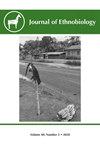Maize Landraces and Drought: Seed Systems in San Miguel del Valle, Oaxaca, Mexico
IF 1.3
3区 社会学
Q1 ANTHROPOLOGY
引用次数: 0
Abstract
Abstract. Maize diversity in southern Mexico is threatened as climate change and sociopolitical factors limit the ability of small-scale farmers to continue agricultural production. Between 2017 and 2019, I conducted ten months of ethnographic research on maize agriculture in San Miguel del Valle (San Miguel), a Zapotec community in the Central Valleys of Oaxaca. In San Miguel, agricultural production is declining due to seasonal droughts that have increased in frequency and intensity in recent generations. Farmers who continue to plant maize use exclusively their own or locally acquired seeds of native landraces. Worsening seasonal droughts play a significant role in determining what seeds farmers plant and whether farmers choose to continue planting. Farmers plant locally sourced seeds partly because they believe these to be the only available seeds that will produce a harvest in their fields. This points to important interactions between environmental conditions, seed choice, and farmers' livelihoods. I contribute to existing literature on maize diversity and in situ conservation by using an ethnographic approach to describe seed saving practices and networks in San Miguel.玉米地方品种与干旱:墨西哥瓦哈卡州圣米格尔山谷的种子系统
摘要由于气候变化和社会政治因素限制了小规模农民继续农业生产的能力,墨西哥南部的玉米多样性受到威胁。2017年至2019年间,我在瓦哈卡州中央山谷的扎波特克社区圣米格尔山谷(圣米格尔)对玉米农业进行了为期十个月的民族志研究。在圣米格尔,由于近几代人季节性干旱的频率和强度增加,农业产量正在下降。继续种植玉米的农民完全使用他们自己或当地获得的当地人种的种子。日益恶化的季节性干旱在决定农民种植什么种子以及农民是否选择继续种植方面发挥着重要作用。农民种植当地来源的种子,部分原因是他们相信这些种子是唯一能在他们的田地里收获的种子。这表明了环境条件、种子选择和农民生计之间的重要相互作用。我通过使用人种学方法描述圣米格尔的种子保存实践和网络,为现有的玉米多样性和原位保护文献做出了贡献。
本文章由计算机程序翻译,如有差异,请以英文原文为准。
求助全文
约1分钟内获得全文
求助全文
来源期刊

Journal of Ethnobiology
Social Sciences-Anthropology
CiteScore
4.80
自引率
3.40%
发文量
21
审稿时长
>12 weeks
期刊介绍:
JoE’s readership is as wide and diverse as ethnobiology itself, with readers spanning from both the natural and social sciences. Not surprisingly, a glance at the papers published in the Journal reveals the depth and breadth of topics, extending from studies in archaeology and the origins of agriculture, to folk classification systems, to food composition, plants, birds, mammals, fungi and everything in between.
Research areas published in JoE include but are not limited to neo- and paleo-ethnobiology, zooarchaeology, ethnobotany, ethnozoology, ethnopharmacology, ethnoecology, linguistic ethnobiology, human paleoecology, and many other related fields of study within anthropology and biology, such as taxonomy, conservation biology, ethnography, political ecology, and cognitive and cultural anthropology.
JoE does not limit itself to a single perspective, approach or discipline, but seeks to represent the full spectrum and wide diversity of the field of ethnobiology, including cognitive, symbolic, linguistic, ecological, and economic aspects of human interactions with our living world. Articles that significantly advance ethnobiological theory and/or methodology are particularly welcome, as well as studies bridging across disciplines and knowledge systems. JoE does not publish uncontextualized data such as species lists; appropriate submissions must elaborate on the ethnobiological context of findings.
 求助内容:
求助内容: 应助结果提醒方式:
应助结果提醒方式:


